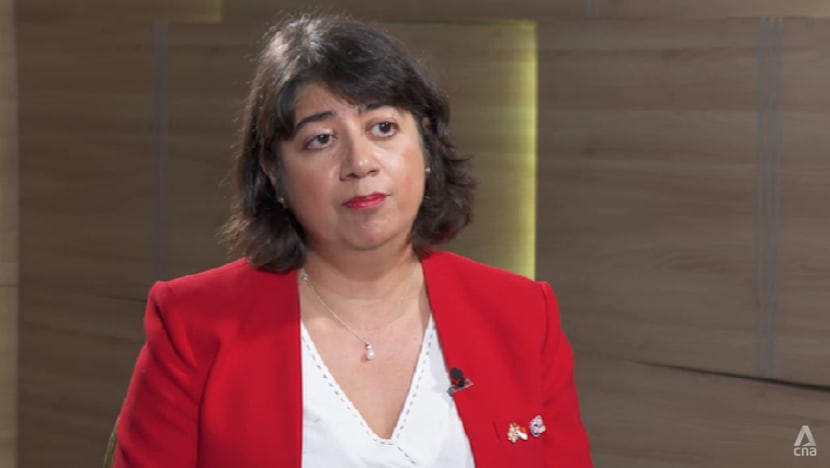UK wants more cooperation with Singapore in tech, defence and energy: British minister for Indo-Pacific
Parliamentary Under-Secretary of State for Indo-Pacific Seema Malhotra spoke about six decades of diplomatic ties with Singapore and security in the Indo-Pacific in an interview with CNA’s Sherlyn Seah.

Britain’s Parliamentary Under-Secretary of State for Indo-Pacific Seema Malhotra during an interview with CNA.

This audio is generated by an AI tool.
SINGAPORE: The United Kingdom is looking to deepen cooperation with Singapore in areas including technology, defence and clean energy, as both nations mark 60 years of diplomatic relations.
Britain’s Parliamentary Under-Secretary of State for Indo-Pacific Seema Malhotra said the longstanding partnership is evolving to meet emerging priorities – from digital governance and artificial intelligence to climate change and regional security.
With competition intensifying between major powers, Britain also wants to position itself as a trusted digital and security partner for Southeast Asian nations, the minister told CNA during her official visit to Singapore last week.
“What's really important is to be able to have a conversation about our shared priorities – our priorities around economic growth, security and stability,” she said.
“Also, the steps we're taking to look at the opportunities and adoption of new technologies, of AI and how we're working together on tackling climate change.”
Her trip is part of her first official tour of Southeast Asia, amid the UK government’s renewed push to strengthen its strategic and economic footprint in the Indo-Pacific.
EXPANDING ECONOMIC PARTNERSHIP
Singapore and the UK have seen growing collaboration across investment and trade, underpinned by the 2022 UK-Singapore Digital Economy Agreement.
The landmark pact establishes shared rules on cornerstones of the digital economy such as cybersecurity and data protection, and has paved the way for partnerships in green finance and digital innovation.
Additionally, bilateral trade has climbed to about S$40 billion (US$31 billion), accounting for around 40 per cent of the UK’s total trade with Southeast Asia.
New and ongoing collaborations are expected to drive job creation and technological development in both countries, said Ms Malhotra.
She highlighted one key example – a partnership between British company Aurrigo and Changi Airport Group.
The two are testing driverless baggage vehicles for the upcoming Terminal 5, showcasing the intersection of UK robotics expertise and Singapore’s Smart Nation ambitions to build one of the world's most advanced aviation hubs.
“That has been a really important collaboration … creating those opportunities, jobs and improving experience and application of technology in different ways,” she said.
DEFENCE & SECURITY
The UK’s defence ties with Singapore are also deep-rooted through the Five Power Defence Arrangements (FPDA).
The pact, one of Southeast Asia’s oldest security frameworks, unites Britain, Singapore, Malaysia, Australia and New Zealand.
Ms Malhotra said the agreement and its continued relevance reflects a foundation of trust and cooperation built over decades.
“It strikes at the heart of the sense of the strength of our relationship and the trust,” she added. “It is a recognition that we must work together on security, on which there may be new challenges of the future.”
UK-ASEAN TIES
Ms Malhotra noted that the UK’s partnership with the Association of Southeast Asian Nations (ASEAN) continues to evolve.
Prior to Singapore, she attended the UK-ASEAN AI Innovation Summit in Kuala Lumpur. The summit was aimed at deepening cooperation on AI governance and practical applications between Britain and the bloc.
“It's (about) recognising the opportunities and impacts of AI … (such as) how we deal with security, or innovations that will support … public services, or make medical diagnostics and other applications,” she said.
“But we can't make these areas of progress on our own. AI and the governance of AI have to go across our countries and regions.”
She added the UK’s approach to the Indo-Pacific is fostered on trust and shared prosperity.
“We continue to see defence and security being part of our international collaboration … defence and prevention of warfare through new technologies … the training of our personnel as a collaborative exercise,” she said.
“Our security (and) prosperity in Europe are very interconnected with the security and prosperity in the Indo-Pacific.”














